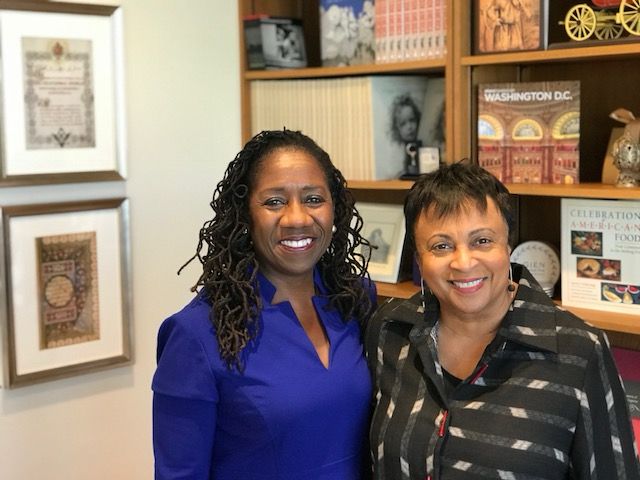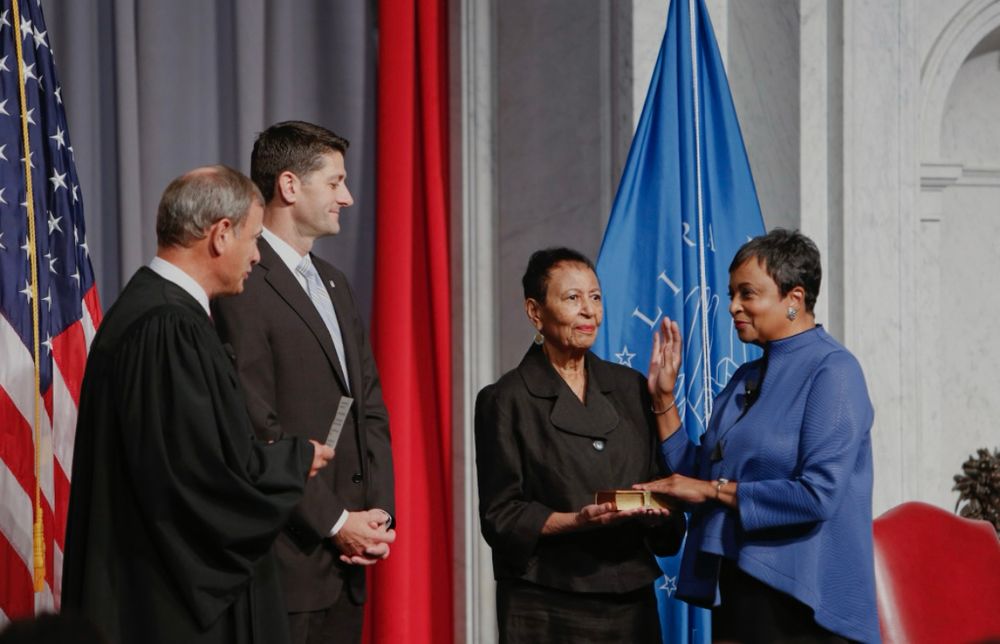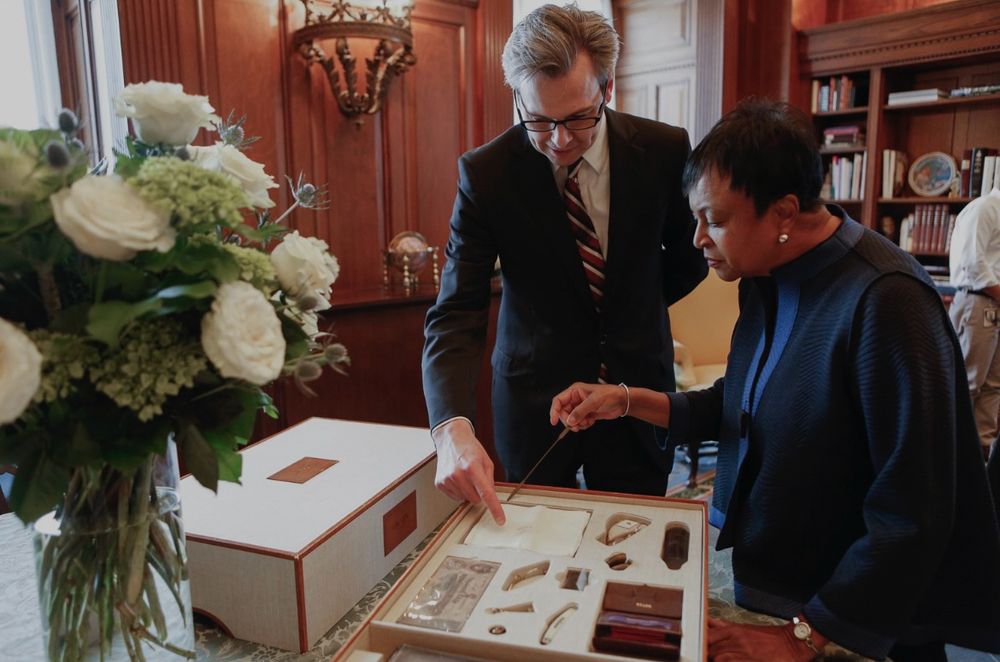
Abstract: Under the banner of progress, products have been uncritically adopted or
even imposed on users — in past centuries with tobacco and combustion engines, and in
the 21st with social media. For these collective blunders, we now regret our involvement or
apathy as scientists, and society struggles to put the genie back in the bottle. Currently, we
are similarly entangled with artificial intelligence (AI) technology. For example, software updates are rolled out seamlessly and non-consensually, Microsoft Office is bundled with chatbots, and we, our students, and our employers have had no say, as it is not
considered a valid position to reject AI technologies in our teaching and research. This
is why in June 2025, we co-authored an Open Letter calling on our employers to reverse
and rethink their stance on uncritically adopting AI technologies. In this position piece,
we expound on why universities must take their role seriously toa) counter the technology
industry’s marketing, hype, and harm; and to b) safeguard higher education, critical
thinking, expertise, academic freedom, and scientific integrity. We include pointers to
relevant work to further inform our colleagues.

Figure 1. A cartoon set theoretic view on various terms (see Table 1) used when discussing the superset AI
(black outline, hatched background): LLMs are in orange; ANNs are in magenta; generative models are
in blue; and finally, chatbots are in green. Where these intersect, the colours reflect that, e.g. generative adversarial network (GAN) and Boltzmann machine (BM) models are in the purple subset because they are
both generative and ANNs. In the case of proprietary closed source models, e.g. OpenAI’s ChatGPT and
Apple’s Siri, we cannot verify their implementation and so academics can only make educated guesses (cf.
Dingemanse 2025). Undefined terms used above: BERT (Devlin et al. 2019); AlexNet (Krizhevsky et al.
2017); A.L.I.C.E. (Wallace 2009); ELIZA (Weizenbaum 1966); Jabberwacky (Twist 2003); linear discriminant analysis (LDA); quadratic discriminant analysis (QDA).

Table 1. Below some of the typical terminological disarray is untangled. Importantly, none of these terms
are orthogonal nor do they exclusively pick out the types of products we may wish to critique or proscribe.

Protecting the Ecosystem of Human Knowledge: Five Principles
Finally! 🤩 Our position piece: Against the Uncritical Adoption of 'AI' Technologies in Academia:
doi.org/10.5281/zeno...
We unpick the tech industry’s marketing, hype, & harm; and we argue for safeguarding higher education, critical
thinking, expertise, academic freedom, & scientific integrity.
1/n
06.09.2025 08:13 — 👍 3241 🔁 1652 💬 100 📌 285
you, finding a similar paper to one you're writing: scooped, career over
me, finding a similar paper to one i'm writing: strengthens my introduction, builds on literature, stronger argument
30.07.2025 22:30 — 👍 67 🔁 9 💬 1 📌 2
No, a LOT of them think that. Science may be one of the most social forms of knowledge production we have. Arguably it’s at least as social as creative writing. Actual scientists will tell you this. Yet, millions of people think they can do science alone with an LLM.
21.07.2025 15:37 — 👍 1353 🔁 308 💬 12 📌 20
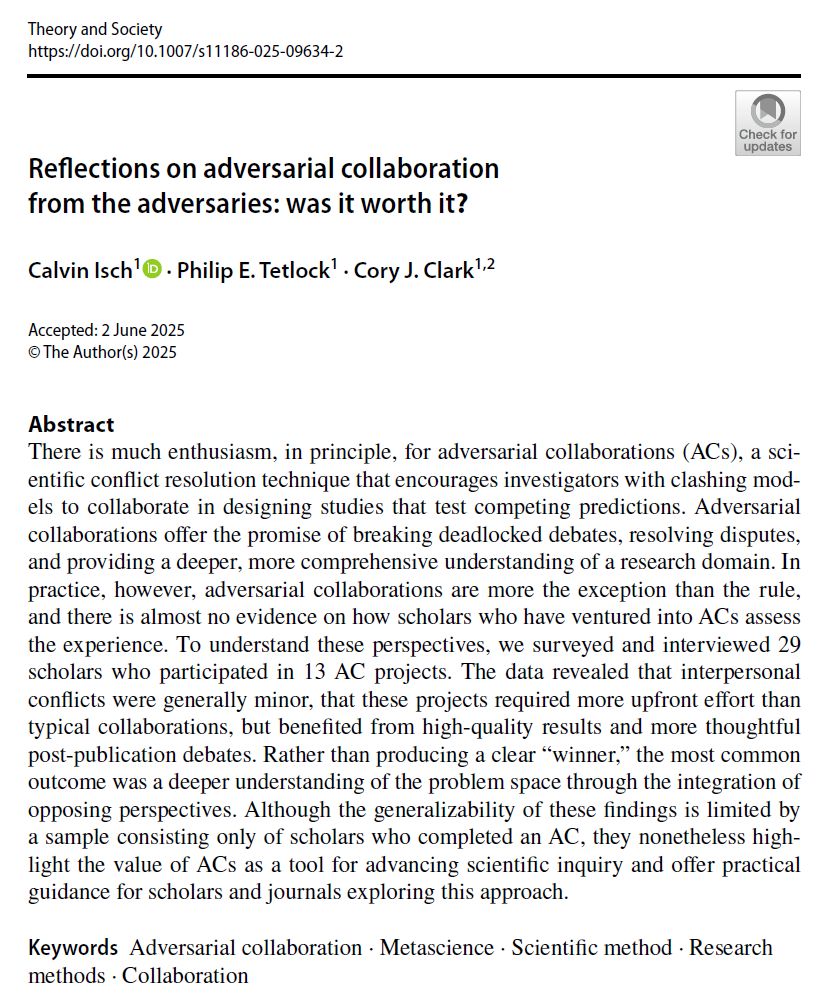
There is much enthusiasm, in principle, for adversarial collaborations (ACs), a scientific conflict resolution technique that encourages investigators with clashing models to collaborate in designing studies that test competing predictions. Adversarial collaborations offer the promise of breaking deadlocked debates, resolving disputes, and providing a deeper, more comprehensive understanding of a research domain. In practice, however, adversarial collaborations are more the exception than the rule, and there is almost no evidence on how scholars who have ventured into ACs assess the experience. To understand these perspectives, we surveyed and interviewed 29 scholars who participated in 13 AC projects. The data revealed that interpersonal conflicts were generally minor, that these projects required more upfront effort than typical collaborations, but benefited from high-quality results and more thoughtful post-publication debates. Rather than producing a clear “winner,” the most common outcome was a deeper understanding of the problem space through the integration of opposing perspectives. Although the generalizability of these findings is limited by a sample consisting only of scholars who completed an AC, they nonetheless highlight the value of ACs as a tool for advancing scientific inquiry and offer practical guidance for scholars and journals exploring this approach.
29 scholars reflect on their participation in adversarial collaborations:
“Rather than producing a clear 'winner,' the most common outcome was a deeper understanding of the problem space through the integration of opposing perspectives”
Open Access: doi.org/10.1007/s111...
#MetaSci #Methodology 🧪
15.07.2025 13:40 — 👍 48 🔁 18 💬 3 📌 1
very exciting! congrats!
02.07.2025 19:18 — 👍 1 🔁 0 💬 1 📌 0
My friend and colleague Remco Heesen once told me study of social epistemology of science made him "less trusting of any particular scientific paper but more impressed by science as a whole." I honestly think that's the right lesson to draw. But I think holding both attitudes doesn't come naturally.
24.06.2025 05:38 — 👍 426 🔁 98 💬 17 📌 6
great article—give it a read!
19.06.2025 09:14 — 👍 15 🔁 7 💬 0 📌 0
NSF is rejecting near-perfect applications for DEI-related projects on the grounds that they don't fit administration priorities. And I worry that the administration's goal isn't just to stop DEI research but to push the scholars doing this work out of academia, since tenure often hinges on grants.
12.06.2025 20:40 — 👍 228 🔁 84 💬 4 📌 5
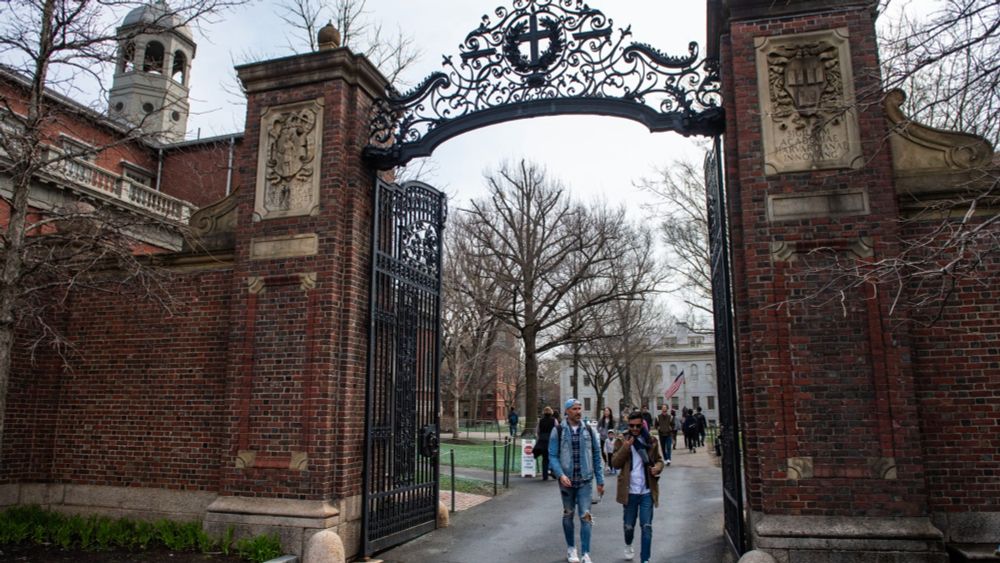
Trump administration revokes Harvard's ability to enroll international students
International students make up more than a quarter of Harvard University's student body. Harvard says the government's actions, which could cut off a major revenue stream, are "unlawful."
International students upend their lives to join American science, bringing their novel insights that drive innovation.
Now, they are being illegally targeted by Trump, because Harvard won't back down.
Classic bully behavior.
We Stand Up for International Students.
www.npr.org/2025/05/22/n...
22.05.2025 19:42 — 👍 412 🔁 121 💬 10 📌 13
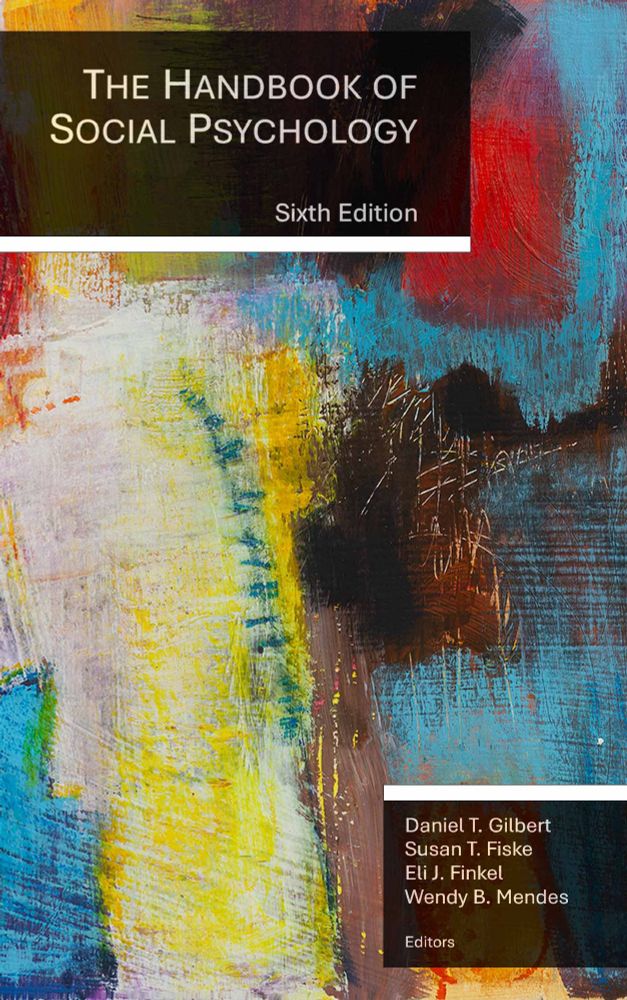
Cover of the Handbook of Social Psychology 6th edition 2025
Since 1954, "The Handbook of Social Psychology" has been the field’s most authoritative reference work, and today is the launch of the 6th edition with 50 new chapters by 100 leading scholars. Best news? The HSP is now an open-access public resource—free to read, download, and share. the-hsp.com
19.05.2025 15:49 — 👍 248 🔁 109 💬 10 📌 15
There’s been some “advice” coming from some quarters for scientists not to focus on DEI-related funding cuts.
I wholly reject this concept.
Cutting programs designed to reduce science and healthcare disparities is as detrimental to science as anything else, both morally and functionally.
17.05.2025 14:37 — 👍 1507 🔁 340 💬 23 📌 24
There is a false dichotomy drawn between "the ivory tower" and "the real world," and I'm here to report that in a post-industrial society, your real-world economy absolutely hinges on the university.
University towns are factory towns. Universities drive economic activity, not the other way around.
18.05.2025 09:20 — 👍 4603 🔁 1331 💬 70 📌 115
These are important points. Univ. of Michigan is the 3rd largest employer in Michigan. Due to stable jobs and good benefits, people with all educ. backgrounds have jobs. So do places UM buys from.
18.05.2025 15:43 — 👍 123 🔁 39 💬 3 📌 1

Why I’m Resigning from the NSF and Library of Congress
I cannot participate in systems that require dishonesty as the price of belonging.
“This hollowing out [of NSF] … has material consequences for which research questions get asked, which datasets get produced, which knowledge gets produced, and which perspectives shape our understanding of pressing societal challenges.”
time.com/7285045/resi...
13.05.2025 13:06 — 👍 28 🔁 14 💬 0 📌 0
i’ve used ERIC for both my own research and especially as a library ref worker helping students find resources for writing papers. ERIC getting shut down will be so detrimental on so many levels
09.05.2025 23:48 — 👍 4 🔁 0 💬 0 📌 0
I am teaching my phd writing workshop course this quarter, question: are there any words/phrases said to you by an advisor/mentor that stuck with you, were memorable, or particularly helpful? If so please reply below!
23.04.2025 19:45 — 👍 650 🔁 147 💬 342 📌 61
fascinating paper, gave me a lot to think about—greatly enjoyed!
17.04.2025 14:58 — 👍 1 🔁 0 💬 1 📌 0
as i’m writing up a manuscript right now this is clearer then ever, and it’s remarkable to see things that took up so much intentional thought make up one line in the final paper
13.04.2025 20:54 — 👍 2 🔁 0 💬 0 📌 0
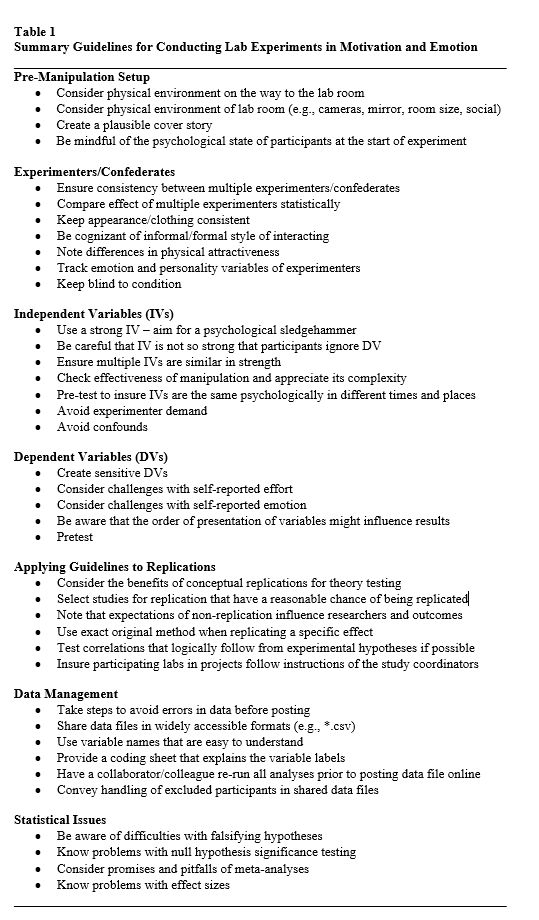
Table 1
Summary Guidelines for Conducting Lab Experiments in Motivation and Emotion
___________________________________________________________________________
Pre-Manipulation Setup
• Consider physical environment on the way to the lab room
• Consider physical environment of lab room (e.g., cameras, mirror, room size, social)
• Create a plausible cover story
• Be mindful of the psychological state of participants at the start of experiment
Experimenters/Confederates
• Ensure consistency between multiple experimenters/confederates
• Compare effect of multiple experimenters statistically
• Keep appearance/clothing consistent
• Be cognizant of informal/formal style of interacting
• Note differences in physical attractiveness
• Track emotion and personality variables of experimenters
• Keep blind to condition
Independent Variables (IVs)
• Use a strong IV – aim for a psychological sledgehammer
• Be careful that IV is not so strong that participants ignore DV
• Ensure multiple IVs are similar in strength
• Check effectiveness of manipulation and appreciate its complexity
• Pre-test to insure IVs are the same psychologically in different times and places
• Avoid experimenter demand
• Avoid confounds
Dependent Variables (DVs)
• Create sensitive DVs
• Consider challenges with self-reported effort
• Consider challenges with self-reported emotion
• Be aware that the order of presentation of variables might influence results
• Pretest
Applying Guidelines to Replications
• Consider the benefits of conceptual replications for theory testing
• Select studies for replication that have a reasonable chance of being replicated
• Note that expectations of non-replication influence researchers and outcomes
• Use exact original method when replicating a specific effect
• Test correlations that logically follow from experimental hypotheses if possible
• Insure participating labs in projects follow instructions of the study coordinators
Data Management
• Take steps to avoid errors i…
Very useful set of guidelines for conducting social psychology lab experiments by @eddiehj.bsky.social, @davidamodio.bsky.social, and colleagues.
Preprint: doi.org/10.31234/osf...
Few quotes follow…
11.04.2025 08:37 — 👍 75 🔁 22 💬 1 📌 3
We *must* protect the National Museum of African American History and Culture.
28.03.2025 00:53 — 👍 60 🔁 25 💬 2 📌 0
“Our teaching and research only matter under general conditions of freedom and dignity. These conditions do not exist under the threat of arbitrary arrest, imprisonment, deportation, or suspension of medical care. “
Worth the read!
22.03.2025 13:05 — 👍 1 🔁 0 💬 0 📌 0
BREAKING: In response to our lawsuit, the National Endowment for the Arts will no longer force grant applicants to certify that they won't promote "gender ideology."
This is a big step toward defeating the NEA's unconstitutional censorship.
07.03.2025 23:46 — 👍 8252 🔁 1551 💬 47 📌 65
this was a great read, really thought-provoking; thanks for sharing!
07.03.2025 03:47 — 👍 1 🔁 0 💬 1 📌 0
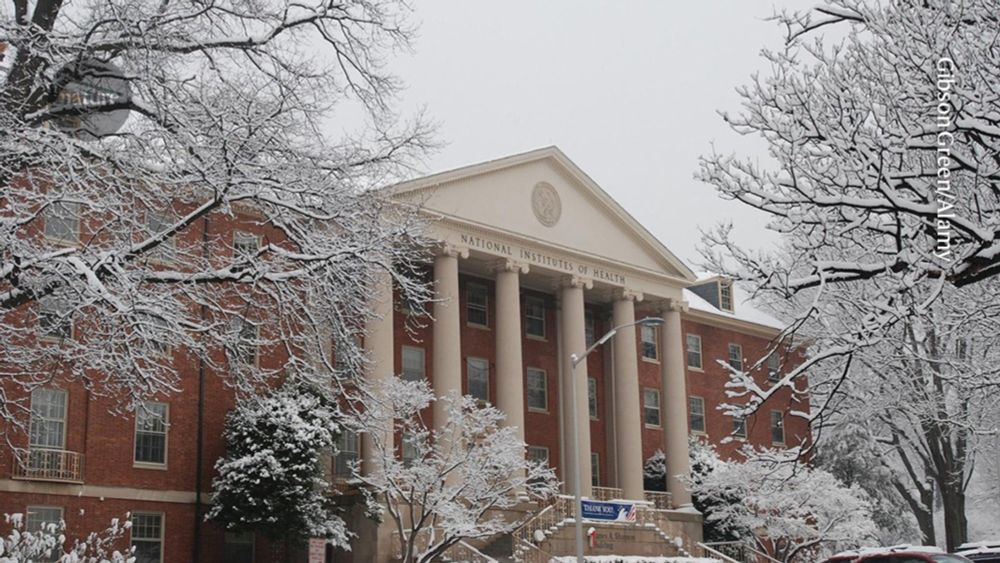
Exclusive: NIH to terminate hundreds of active research grants
Studies that touch on LGBT+ health, gender identity and DEI in the biomedical workforce could be terminated, according to documents obtained by Nature.
“It’s extremely alarming that grants that have been vetted by the scientific community and deemed important and impactful to understand the world are now being cancelled because of political ideology,” says @lkfazio.bsky.social.
“This is direct censorship of scientific research.”
06.03.2025 02:17 — 👍 791 🔁 374 💬 17 📌 13
Excellent 🧵 on this evening's NIH announcement of a dramatic reduction in indirect rates for research institutions, which amounts to a generational restructuring of the US research and development ecosystem. These cuts are effective immediately, not just for new grants but for existing ones.
08.02.2025 00:44 — 👍 927 🔁 401 💬 40 📌 31
The entire archive of CDC datasets can be found here.
HUGE shoutout to data archivists- this work is important 👏🙌🏻
archive.org/details/2025...
01.02.2025 18:33 — 👍 11870 🔁 4696 💬 226 📌 224
i’ve used the YRBSS several times for school projects and the fact that it’s just GONE is insane—and so so concerning
01.02.2025 13:17 — 👍 1 🔁 0 💬 0 📌 0

"I encourage researchers to take risks and submit daring work to Social Psychology, even when they fail or might fail in the future."
Editorial from @akfetterman.bsky.social, the new Editor-in-Chief of Social Psychology (@socpsyjournal.bsky.social).
doi.org/10.1027/1864...
01.02.2025 12:57 — 👍 79 🔁 15 💬 2 📌 4
Professor, UW Biology / Santa Fe Institute
I study how information flows in biology, science, and society.
Book: *Calling Bullshit*, http://tinyurl.com/fdcuvd7b
LLM course: https://thebullshitmachines.com
Corvids: https://tinyurl.com/mr2n5ymk
he/him
Señor Research Scientist, NPC at the Hertie School in Berlin 🇩🇪 via Princeton, Mannheim, Edinburgh and a bunch of other ivory towers that will probably be billiard balls and decorative boxes by the end of the decade.
Rome Statute appreciator.
Philosopher and applied mathematician at UC Irvine. Author of The Misinformation Age and Origins of Unfairness. Irish dancer. Mother. Mother of Chickens.
Assistant professor of social psychology and PI of the Identity and Intergroup Relations Lab at Pitt. He/him. 🏳️🌈
🌐: joelleforestier.com
Associate Professor. Keen bean. Writer. Pedagogy, psychology, methods, reflexivity, open science, iced lattes. She/her 🌻
science, gaming, art (senior researcher at university of jyväskylä)
Professor of Psychology, University of Minnesota. Sporadically writing stuff at http://getsyeducated.substack.com
Prof in Philosophy and History of Science & Technology, Technical University of Munich | scientific director Ethical Data Initiative & Public Science Lab | http://opensciencestudies.eu | President ISHPSSB | loves almost all forms of life
Northwestern '18. UCSB Social Psych PhD candidate. FirstGen. She/Her. Proud Bi/Pan/Queer 🏳️🌈
Associate Professor of Philosophy and Director of Cognitive Science at UC Davis. Philosophical Shark Jumper ®️ 🦈
Here for data, data science, analytics engineering, rstats, books
Research Scientist at the University of Washington based in Brooklyn. Also: SFI External Applied Fellow, Harvard BKC affiliate. Collective Behavior, Statistics, etc..
Teacher and social/political psychologist. 🇳🇬
Reposts and likes do not mean endorsement.
Social psychologist at University of Colorado Boulder, broadly studying issues related to identity-safety, belonging, attitudes, and fostering inclusive spaces for WOC.
Science studies scholar: #credibility of sci, #trust #collaboration #integrity #food #STS #reform, @ Maastricht University
Also: @bart@akademieNL.social
Metascientist @ uidaho. I work at the intersection of behavioral sciences, statistics, and philosophy. Love thinking and talking about science. Post lots of cat and food pics. Allergic to unsolicited advice.
曾时昕 | he/they | nsf grfp 2025 recipient, ma social sciences student @ uchicago
interested in intergroup dynamics + identity formation
views and opinions are my own!
Philosopher at VU Amsterdam
PI of ERC-funded project 'Social Epistemology of Argumentation' (2018-2024)
Author of 'The Dialogical Roots of Deduction' (CUP, 2020) and 'Formal Languages in Logic' (CUP, 2012)
🇧🇷 🇳🇱 (she/her)
social psychologist at UMass Amherst, studying intergroup relations, social division, status inequalities, and bridging differences; passionate about translating academic research to make the world a better place.. and dogs 🐾 more at: www.lindatropp.com








